I'm trying to write a regular expression in C++ to match a base64 encoded string. I'm quite familiar with writing complex regular expressions in Perl so I started with that:
use strict;
use warnings;
my $base64_regex = qr{
(?(DEFINE)
(?<B64>[A-Za-z0-9+/])
(?<B16>[AEIMQUYcgkosw048])
(?<B04>[AQgw])
)
^(
((?&B64){4})*
(
(?&B64){4}|
(?&B64){2}(?&B16)=|
(?&B64)(?&B04)={2}
)
)?$}x;
# "Hello World!" base64 encoded
my $base64 = "SGVsbG8gV29ybGQh";
if ($base64 =~ $base64_regex)
{
print "Match!\n";
}
else
{
print "No match!\n"
}
Output:
Match!
I then tried to implement a similar regular expression in C++:
#include <iostream>
#include <regex>
int main()
{
std::regex base64_regex(
"(?(DEFINE)"
"(?<B64>[A-Za-z0-9+/])"
"(?<B16>[AEIMQUYcgkosw048])"
"(?<B04>[AQgw])"
")"
"^("
"((?&B64){4})*"
"("
"(?&B64){4}|"
"(?&B64){2}(?&B16)=|"
"(?&B64)(?&B04)={2}"
")"
")?$");
// "Hello World!" base64 encoded
std::string base64 = "SGVsbG8gV29ybGQh";
if (std::regex_match(base64, base64_regex))
{
std::cout << "Match!" << std::endl;
}
else
{
std::cout << "No Match!" << std::endl;
}
}
but when I run the code I get an exception telling me it is not a valid regular expression.
Catching the exception and printing the "what" string doesn't help much either. All it gives me is the following:
regex_error(error_syntax)
Obviously I could get rid of the "DEFINE" block with my pre-defined subpatterns, but that would make the whole expression very difficult to read... and, well... I like to be able to maintain my own code when I come back to it a few years later lol so that isn't really a good option.
How can I get a similar regular expression to work in C++?
Note: This must all be done within a single "std::regex" object because I am writing a library where users will be able to pass a string to be able to define their own regular expressions and I want these users to be able to "DEFINE" similar subexpressions within their regex if they need to.
